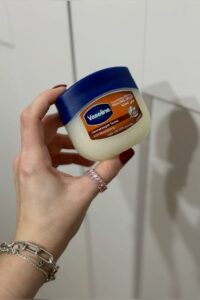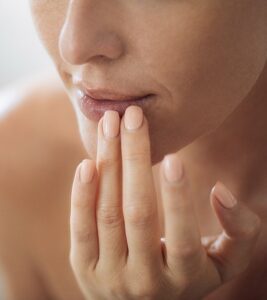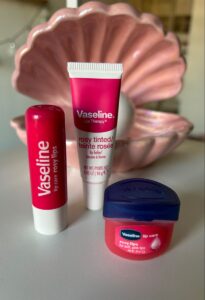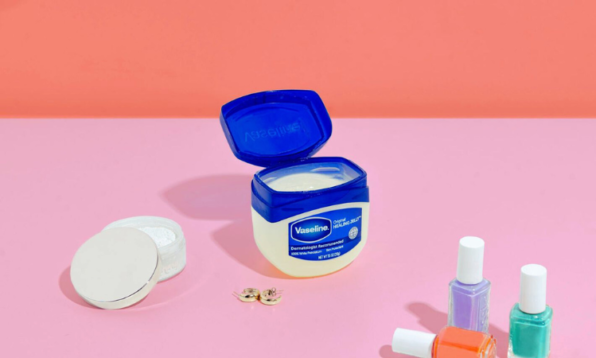We’ve all had that little tub sitting somewhere in our home — Vaseline, the humble petroleum jelly our mothers have been trusting for years. But in today’s skincare-obsessed world, where clean beauty campaigns and ingredient paranoia run rampant, petroleum jelly has found itself under the microscope. Is it safe to use Vaseline on the face as it is derived from crude oil? Does it actually moisturise your lips, or is it just a glorified barrier cream? To demystify the beloved staple, we spoke with dermatologist Dr Thalha, who has addressed these concerns countless times in clinical practice. Here’s what he had to say.
Is Vaseline safe to use on face?

“It’s a concern I frequently encounter in clinical practice,” Dr Thalha admits. But the reassurance is clear: “While it’s true that petroleum jelly is derived from crude oil, the version used in skincare, known as white petrolatum USP, undergoes a rigorous multi-step refinement and purification process.”
In short, the Vaseline you’re using isn’t straight from an oil barrel, it’s been extensively cleaned, filtered, and tested to meet safety standards by bodies like the FDA, EMA, and USP. “It is not dangerous when used as directed. It remains one of the safest and most effective occlusive moisturisers we have.”
Is Vaseline a good moisturiser?
Here’s where things get technical because the truth is Vaseline doesn’t hydrate, at all. It preserves what’s already there. “It acts as an occlusive, creating a protective barrier that prevents the loss of moisture from your lips,” Dr Thalha explained.
So, if your lips are already bone dry and flaky, slapping on Vaseline won’t magically revive them. You need to give it some help, ideally with a hydrating lip balm that contains humectants (like glycerin or hyaluronic acid), followed by Vaseline to seal it in. “That’s why I often recommend a two-step approach: first, apply a hydrating lip balm that contains humectants and ideally, SPF… then, seal it in with Vaseline.”
So, you can never use vaseline to heal your dried lips? Well, you can but you have to use it right. Dr Thalha says, “While it doesn’t directly treat the root cause, its occlusive properties make it an effective agent for restoring the skin barrier, minimising water loss, and creating an environment where the lips can heal naturally.” It’s especially helpful for those suffering from lip-licking habits, eczema, or medication-induced dryness like isotretinoin.
But if there’s an underlying condition like cheilitis or cold sores, Vaseline isn’t a cure, and in some cases, it might even make things worse.
Can Vaseline cause lip pigmentation?

There’s a myth floating around that petroleum jelly causes lip pigmentation. “No, Vaseline does not cause lip darkening or pigmentation when used correctly,” Dr Thalha assured. In fact, it can do quite the opposite. “When used properly, Vaseline can support barrier repair, prevent further irritation, and create a healing environment, all of which can help improve the appearance of dry, discoloured lips over time.”
Can Vaseline cause pimples?
Despite its thick texture, Vaseline is surprisingly kind to pores. “Vaseline is non-comedogenic, meaning it does not clog pores, even on the delicate skin around the lips,” said Dr Thalha. However, the application method matters. “To reduce this risk, always cleanse the lips and surrounding skin before use, apply only a thin layer on the lips, and avoid smearing it onto acne-prone areas like the chin.”
Would Dr Thalha recommend it?
Without hesitation: yes. “Vaseline is one of the safest, most effective, and affordable options for treating dry, chapped lips,” he said. It’s simple, budget-friendly, and backed by decades of use. “It’s not fancy, but it works remarkably well, which is why I regularly recommend it in my practice and use it myself.”
When NOT to use Vaseline

Like everything in skincare, context is key. Dr Thalha doesn’t recommend Vaseline for everyone, especially in certain conditions. “In inflammatory lip conditions such as perioral dermatitis or irritant contact cheilitis, it may also interfere with healing and worsen inflammation.” Vaseline should be completely avoided in preterm or low birth weight infants due to the increased risk of infections.
Are there any “cleaner” alternatives?
For those wanting plant-based or multifunctional options, there are several:
- Ceramide-based ointments: Ideal for dry, sensitive, or eczema-prone skin
- Shea butter: Delivers antioxidants and softens skin
- Lanolin: Great for cracked lips, but may cause allergies
- Squalane: Lightweight and non-greasy, good for acne-prone skin
- Beeswax balms: Offer antibacterial benefits but watch out for essential oils
“These alternatives may require more frequent reapplication compared to Vaseline but can provide additional nutrients and a more luxurious feel,” the dermatologist says.
To connect with dermatologist Dr Mohammed Thalha for more personalised skin and hair care advice, find him here.
Featured Image Source
Related: 10 Tried And Tested Uses Of Vaseline Apart From Moisturising Dry Lips

 Web Stories
Web Stories











